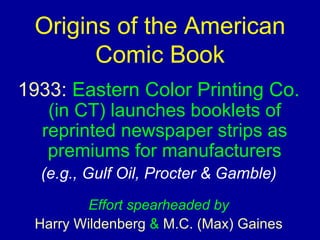Comic Books (Golden Age)
- 1. Origins of the American Comic Book 1933: Eastern Color Printing Co. (in CT) launches booklets of reprinted newspaper strips as premiums for manufacturers (e.g., Gulf Oil, Procter & Gamble) Effort spearheaded by Harry Wildenberg & M.C. (Max) Gaines
- 2. Origins of the American Comic Book 1934: Eastern Color Printing launches first stand-alone comic book in definitive periodical format, Famous Funnies (again, reprinting newspaper strips)
- 3. Ã˝
- 4. Origins of the American Comic Book Late ’34: NYC-based Malcolm Wheeler-Nicholson launches first comic book series consisting of new, original material, New Fun The co. he founded later became Detective Comics, Inc., then National Periodical Pub., then eventually “ DC .”
- 5. Origins of the American Comic Book Late mid-30s: Assembly-line “shop system” of comic book production
- 6. Ã˝
- 7. Origins of the American Comic Book Early ’38: National’s Action Comics No. 1 inaugurates the “costume” (superhero) genre with Jerry Siegel & Joe Shuster’s “Superman” Late 30s – early 40s: Meteoric growth of comic book industry
- 8. Ã˝
- 9. Ã˝
- 10. Ã˝
- 11. Ã˝
- 12. Ã˝
- 13. Comic Book Sales (rough estimates) 1940: 10 million / month 1942: 12.5 million / month 1944: 20 million / month (thanks in part to servicemen) 1947: 60 million / month
- 14. Comic Book Trends besides the Superhero “ Funny Animal” and related children’s humor comics (from 1941-1942, with the work of Carl Barks, Walt Kelly, George Carlson, et al.)
- 15. Funny Animal & Children’s Humor
- 16. Ã˝
- 17. Ã˝
- 18. Ã˝
- 19. Ã˝
- 20. Ã˝
- 21. Comic Book Trends besides the Superhero “ Teenage” Comics à la Archie (from 1941, but especially after WW2, c. 1946)
- 25. Comic Book Trends besides the Superhero Crime Comics (from 1942, but especially after WW2, c. 1946)
- 26. Crime Comics
- 27. Ã˝
- 28. Ã˝
- 29. Ã˝
- 30. Ã˝
- 31. Ã˝
- 32. Ã˝
- 33. Post-WW2 Romance (1947– )
- 34. Romance Comics
- 35. Ã˝
- 36. Ã˝
- 37. Ã˝
- 38. Ã˝
- 39. Post-WW2 Horror (1950– )
- 40. Horror Comics!
- 41. Ã˝
- 42. Ã˝
- 43. Ã˝
- 44. Ã˝
- 45. Ã˝
- 46. Post-WW2 Satire à la Mad (1952– )
- 47. Mad (1952– ) Published by EC, created by Harvey Kurtzman (editor & head writer, Nos. 1-28)
- 48. Ã˝
- 49. Ã˝
- 50. Ã˝

















































